INTRODUCTION
The Initiative on Race, Gender and Globalization (IRGG) was established at the beginning of the academic year 2004-2005 with the support of the Office of the Provost. The primary goals of the IRGG are to internationalize the undergraduate and graduate curricula through scholarly events that foster intellectual exchange across geographic borders and political perspectives. Both in his speech “The Internationalization of the University” and in his Baccalaureate Address “Life on a Small Planet,” President Levin speaks about the global university and the importance of working across political and geographic boundaries in our contemporary world. He notes in his Baccalaureate Address that “this nation has suffered through much of its history from isolation and insularity.” To often,” he notes, “our leaders have been insufficiently mindful of how America is perceived throughout the world.” For the past 7 years the IRGG has committed itself to organizing and sponsoring colloquia, conferences, events, and speakers that not only address issues of national “isolation and insularity,” but also challenge the Yale University community to think transnationally and cross culturally about politics, the arts, economics, and history.
JAMES WALVIN: PIONEERING THE HISTORY OF BLACK BRITAIN
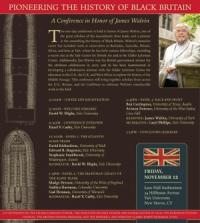
The IRGG began the academic year by cosponsoring a one-day conference dedicated to James Walvin’s scholarship. Titled Pioneering the History of Black Britain: A Conference in Honor of James Walvin, the conference convened a group of international and national scholars at Luce Hall Auditorium on Friday, November 12, 2010 to address scholarly areas in which Professor Walvin has made significant contributions. Sponsorship for this event came from the following institutional bodies at Yale: Gilder Lehrman Center, the European Council, the British Studies Program, and the Edward J. and Dorothy Clarke Kempf Memorial Fund, and the IRGG.
The first panel, “The Atlantic Slave Trade,” examined the methodological implications of Professor Walvin’s use of individual lives to narrate sweeping histories of the Atlantic world. The panel consisted of the following scholars: David Richardson (University of Hull); Edward B. Rugemer (Yale University); and Stephanie Smallwood (University of Washington). David W. Blight moderated the panel.
The second panel, “The Diasporan Legacy of the Slave Trade,” discussed Professor Walvin’s contributions to our historical and modern understanding of Britain and its former colonies, and the transnational shaping of race and racism. This panel included the following scholars: Madge Dresser (University of the West of England); Saidiya Hartman (Columbia University); and Gad Heuman (University of Warwick). Professor Hazel V. Carby (Yale University) moderated the panel.
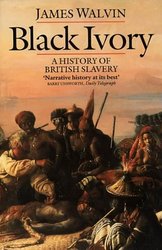
The final panel, “Race and Sport,” addressed Professor Walvin’s influence on our understanding of the ways in which both race and class shape the history of sports. This panel included the following scholars: Ben Carrington (University of Texas); Aviston Downes (University of the West Indies, Cave Hill). Caryl Phillips (Yale University) moderated the panel. The panel also included a response from Professor Walvin.
Professor Carby delivered the opening remarks, and Professor Blight delivered the concluding remarks.
WHAT IS CARIBBEAN STUDIES? PRISMS, PARADIGMS, PRACTICES
The IRGG concluded the academic year by cosponsoring an international and campus-wide symposium titled “What is Caribbean Studies: Prisms, Paradigms, Practices.” All of the symposium’s proceedings will be published in a Special Issue of Small Axe, an internationally recognized and peer-reviewed journal of Caribbean Studies. The IRGG thanks the following institutional bodies at Yale for cosponsoring our event: Edward J. and Dorothy Clarke Kempf Memorial Fund; the Council on Latin American and Iberian Studies’ U.S. Department of Education Title VI Grant; Whitney Humanities Center; African American Studies; the Initiative on Race, Gender, and Globalization; and Small Axe journal.
Held on April 1 and 2, 2011 at the Whitney Humanities Center, What is Caribbean Studies: Prisms, Paradigms, and Practices built upon a preliminary international workshop held at Yale in fall 2009 titled New Directions in Caribbean Studies. Informed by the debates that emerged at New Directions, What is Caribbean Studies raised the following questions: what constitutes the ‘Caribbean’ in Caribbean Studies? To what extent do the divergent locations, subjectivities, and traumas captured by the term Caribbean render a fixed notion of the Caribbean impossible? What is gained or missed by applying concepts such as empire, transnationalism, globalization, and neoliberalism to locations historically imagined as the Caribbean?
The organizing committee for What is Caribbean Studies included two Yale faculty members (Professors Hazel V. Carby and Professor M. Kamari Clarke), two Yale graduate students (Carlos Miranda and Heather Vermeulen), and one faculty member from Columbia University (David Scott).
The organizing committee structured the symposium’s panels as cross-disciplinary rather than thematically driven dialogues because it aimed to advance interdisciplinary approaches to issues pertaining to the study of the Caribbean. The organizing committee was guided by the assumption that in performing methodological boundary crossings through interdisciplinary dialogue, the symposium would cultivate a form of scholarly exchange able to grapple with questions about the political and aesthetic topography of the Caribbean holistically.
The symposium’s format included 7 panels, one of which included a film screening and a dialogue with the director. Also, all of the panels included a moderator from Yale University. Professor Hazel V. Carby (Yale University) delivered introductory remarks; Professor David Scott (Columbia University) delivered the keynote; and, Professor Kamari Clarke delivered the closing remarks.
CARIBBEAN STUDIES: METHODOLOGY
Questions concerning methodology informed the discussion of Panel 1. This panel included the following scholars: Jorge Giovannetti, Harvey Neptune, and Michelle Stephens. Jafari Allen moderated and responded to this panel.
Jorge Giovannetti is Associate Professor and Acting Chair of the Department of Sociology and Anthropology at the University of Puerto Rico, Río Piedras. He is the author of the book Sonidos de condena: Sociabilidad, historia, y política en la música reggae de Jamaica (2001) and coeditor of a special issue of Caribbean Studies on Garveyism in the Hispanic Caribbean (2003).
Professor Giovanetti presented a paper titled “Unintended “Caribbeanism”: Insights and Challenges from a Practice towards Caribbean Studies” at the symposium. His presentation assessed 3 areas “to highlight the insights and challenges for the field as it was (and is) conceived, and in its possible future (or present) reconfiguration(s). The first area is research, with particular emphasis on my own examination of intra-Caribbean migration. Second, I deal with the practice of intellectual exchange and dissemination of intellectual work. Third, I confront the location of Caribbean area studies in research and curricular agendas in higher education, as someone working within the region. Relying on research and scholarly practice, I will try to assess and question the theoretical and conceptual elements constituting Caribbean Studies as a field.”

Harvey Neptune trained in the fields of African Diaspora and Latin American history. His research and writing concentrate on the post-emancipation Caribbean. In his forthcoming history of Trinidad, he uses the colony as an instructive space for understanding how people across the globe have contended with the making of the American century. Professor Neptune presented a paper titled “Calibanizing the Yankees: The Americas Future of Caribbean Studies” at the symposium. In his presentation he contended that “in our present moment, Caribbean studies – especially cultivated here in US territory – might be usefully re-charted as a particular manifestation of American Studies. This frame not only situates knowledge of the region in its proper geographical context but also grants it a greater strategic facility to inform on the recognizable culture and history of the United States.”

Michelle Stephens is Associate Professor of English at Rutgers University. She is the author of Black Empire: The Masculine Global Imaginary of Caribbean Intellectuals in the United States, 1914 to 1962 (Duke University Press, 2005), a member of the Radical History Review Editorial Collective, and is currently working on a manuscript entitled, “Skin Acts: New World Black Male Performance and the Desire for Difference.” Professor Stephens presented a paper titled “The Paradigm of Difference: Renegotiating Crosscultural Desire in the Caribbean-American Archipelago.” She noted that “As we move forward, Hardt and Negri’s critique of difference as essential to rather than in opposition to Empire should certainly inform our questioning of the utility of notions of empire and difference in Caribbean Studies. And the fact that the discourse of a new post-racialism has a genealogy in the work of two key postcolonial scholars, Paul Gilroy and Emmanuel Eze, should also give us pause to at least evaluate the desire for cross-cultural connection that is embedded in the notion of the post- racial, despite our suspicions of the term.
Finally, it was one of our foremost theorists of Caribbean discourse, Edouard Glissant, who posed the idea of relationality as the way to understand regional epistemologies, both in terms of how Caribbeans relate to each other and the other geographic and cultural entities with us in the New World, but also, how we relate to our history of engagement with various imperial metropoles.
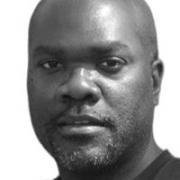
Jafari Allen moderated and responded to the panel. He is Assistant Professor of African American Studies and Anthropology. Professor Allen works at the intersections of [queer] sexuality, gender and blackness — in Cuba, the US, and transnationally. Dr. Allen’s forthcoming critical ethnography,¡Venceremos?: Sexuality, Gender and Black Self-Making in Cuba [Perverse Modernities series of Duke University Press, Fall 2011], marshals a combination of historical, literary, and cultural analysis—most centrally, ethnographic rendering of the everyday experiences and reflections of Black Cubans— to show how Black men and women strategically deploy, reinterpret, transgress and potentially transform racialized and sexualized interpellations of their identities, through “erotic self- making.”
His current research project, “Once Removed: Queer Alternatives and the Redemption of a Transnational Black Counter- public, traces the work of Black transgender, lesbian, bisexual gay, and same gender loving artists, activists, organic intellectuals, and everyday people, that, continuing in the insurgent Black intellectual tradition, produce trenchant critique of violence, silence, invisibility and forgetting “at home” [in a number of places throughout the Americas] and create forms of politics and expressive practices which resist oppressive structures of the state and global capital.
CARIBBEAN STUDIES: HISTORIOGRAPHY, IDENTITY, AND THE POLITICS OF LOCATION
Questions about historiography, identity, and the politics of location informed the discussion of Panel 2. The following scholars constituted this panel: Alissa Trotz and Melanie Newton. Chris Johnson moderated and responded to the panel.
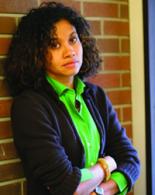
Alissa Trotz is Associate Professor in Women and Gender Studies and Director of Caribbean Studies at New College, University of Toronto. She edits a weekly newspaper column in the Stabroek News, Guyana, and is a member of Red Thread Women’s Organization in Guyana. She presented a paper titled “Unleashing the Potential Within Us: Cautionary Notes on Diaspora” at the symposium. Her presentation engaged the term “’diaspora’, a concept,” she noted, “that has provoked a rich interdisciplinary scholarly tradition in relation to the region. Interested in exploring who is invoking diaspora and under what conditions (in other words, how might we render visible the work that is enabled by and that operates under the sign of diaspora?), Professor Trotz offered “two examples in order to reflect critically - and in a markedly less celebratory fashion - on the recent identification of the diaspora as national and regional governmental strategy in a neo-liberalised Caribbean.”
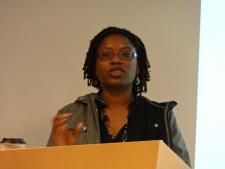
Melanie Newton specializes in the social and cultural history of the Caribbean and the history of slavery, gender and emancipation in the Atlantic World. Her recent publications include the preface to Jerome S. Handler, The Unappropriated People: Freedmen in the Slave Society of Barbados (University of the West Indies Press, 2009 [1974]); The Children of Africa in the Colonies: Free People of Color in Barbados in the Age of Emancipation (Baton Louisiana State University Press, 2008); and “The Road Through Africa: Imperial Nationalism and Diasporic Racial Consciousness in Postslavery Barbados,” in John Chalcraft and Yaseen Nourani (eds.), “Counter-hegemony in the Colony and Postcolony” (Palgrave, 2007).
She presented a paper titled “Return to a Native Land? Indigeneity and Decolonisation in the Anglophone Caribbean” at the symposium.
During her presentation Professor Newton argued that “a sustained and critical engagement with the history of aboriginality in the Caribbean offers constructive avenues for rethinking the place of the Caribbean in the wider Atlantic World, and for realising more fully the potential of intellectual decolonisation. At the same time, thinking about indigeneity through the lens of Caribbean history opens up new and challenging conversations between Caribbean Studies, diaspora studies, aboriginal studies and the concept of ‘modernity’.”
Chris Johnson, a Ford Foundation Predoctoral Fellow and a Ph.D. candidate in the Departments of African American Studies and history at Yale University, moderated and responded to Panel 2. His dissertation-in-progress studies the sex and gender politics of West Indian revolutionaries from the Fourth International to Black Power.
Multiculturalism, identity, and space motivated the discussion of Panel 3. This panel included the following scholars: Roshini Kempadoo, Marlon Griffith, and Mark Raymond.
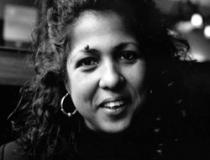
Roshini Kempadoo is a London based Photographer, Media Artist, and Reader in Media Practice at the School of Humanities and Social Sciences, University of East London. She exhibits nationally and internationally. She presented a paper titled “Gazing Outwards and Looking Back: Visualising blackness, Caribbean and transnational perspectives” at the symposium. She argued that “[d]espite the recent momentous demonstrations in Egypt, Tunisia, Libya and Bahrain, two concerns persist in the European consciousness, reinforced in mainstream media and cheap political rhetoric. Germany and the UK have declared state multiculturalism as a failure and the concept of a multicultural society as being over. Rather than embracing the notion of difference as the cornerstone to a successful, progressive society, the project has become embroiled in revisionist ideology of perceived threats to national security, concerns about ‘the enemy within’, and considered in opposition to recent assertions of local and national identity.”
Marlon Griffith is a visual and performance artist. He has shown his work internationally and is currently the recipient of the 2010 John Simon Guggenheim Fellowship and Commonwealth Connections Awards. He presented a paper titled “Ideas, Thoughts, Observations: From My Sketchbook” at the symposium. He noted, “It has taken me a long time as a person and artist, to discover the complexities of a work and the resolution lies in a simple object or gesture. Only through dialogue have I been able to discover more about my work, the ideas on paper and that gestures don’t act immediately but become part of other narratives. My thoughts are constantly shifting but always questioning the role of static representations in our time and it’s implications.”
Mark Raymond is an architect in private practice in Trinidad and Tobago. He studied architecture at the Architectural Association School of Architecture (AA) in London. He is a member of the Royal Institute of British Architects and a member and current president of the Trinidad and Tobago Institute of Architects and Chairman of ACSAC - Association of Commonwealth Societies of Architects in the Caribbean. He presented a paper titled “Regime Change” for the symposium. He noted that “The confluence of complex social and cultural histories, diverse physical landscapes, the legacy of colonialism, erratic economies, the failure of centralised planing and the bewildering reality of globalisation distinguishes the context for the production of Caribbean architecture. It also conspires to confound the emergence of coherent discourse or the development of an informed architectural programme.”
The cinematic implications of the documentary “Bad Friday: Rastafari After Coral Gardens”, a film about the history of violence against Rastafarian communities, directed the discussion of Panel 4. This panel involved the screening of the documentary and a dialogue between Deborah Thomas, the director-producer of the documentary, and film scholar Terri Francis.
Deborah A. Thomas received her Ph.D. in Anthropology from New York University 2000, and is currently an Associate Professor and Chair of the Graduate Group in the Department of Anthropology at the University of Pennsylvania.
Terri Francis, Associate Professor of film studies and African American Studies at Yale University. Professor Francis served as interlocutor and moderator.
CARIBBEAN CULTURAL STUDIES
Panel 5 was driven by questions about Caribbean Cultural Studies. Scholars Aaron Kamugisha and Patricia Saunders composed the fourth panel. Sean Brotherton moderated and responded to this panel.
Aaron Kamugisha is a Lecturer in Cultural Studies at the University of the West Indies, Cave Hill Campus. He completed his PhD in Social and Political Thought at York University in Toronto, and was the 2007/8 Postdoctoral fellow in the Department of African-American Studies at Northwestern University. His current work is a study of coloniality, cultural citizenship and freedom in the contemporary Anglophone Caribbean. He is most recently the editor of a special issue of Race & Class “Caribbean Trajectories: 200 Years On” (October 2007), and has published in theJournal of Caribbean History, Race & Class, Proudflesh, Small Axe and The Philosophical Forum. He is currently the Book Reviews Editor and a member of the editorial working committee for the journal Social and Economic Studies. Professor Kamugisha presented a paper titled “On the Idea of a Caribbean Cultural Studies” at the symposium.
He noted in his presentation that he wished “to advance the claim that the critical study of Caribbean culture is in many ways inseparable from a study of its intellectual traditions in their social, political and aesthetic dimensions. While this may seem unremarkable, it bears emphasizing that the study of culture and the creation of a Caribbean cultural studies emerged in a manner quite distinct from the formation of Cultural Studies in Europe and North America. To this end, I sketch at least four overlapping traditions of writing on culture in the Caribbean which take us from the late 19th century to our present. Following this, I consider the work of two exemplary Caribbean theorists, C.L.R. James and Sylvia Wynter, for their own sustained meditations on the question of culture in the Caribbean.”
Patricia Saunders is an Associate Professor of English and Director of the Caribbean Literary and Cultural Studies program at the University of Miami in Coral Gables. She is the Editor of Anthuirum: A Caribbean Studies Journal and is a member of the Small Axe editorial collective. Her scholarly work has appeared in the Bucknell Review, Plantation Societies in the Americas, Transforming Anthropology, Small Axe, and the Journal of West Indian Literature. She has coedited a collection of essays entitled Music, Memory, Resistance: Calypso and the Caribbean Literary Imagination (Ian Randle Publishers 2007). She is the author of Alien Nation and Repatriation: Translating Identity in Anglophone Caribbean Literature (Lexington Books, Rowman and Littlefield, 2007). Professor Saunder’s presented a paper titled “Buyers Beware, “Hoodwinking” on the Rise: Epistemologies of Consumption in Terry McMillan’s Caribbean” at the symposium.
She noted that “the phenomenon of the black male as an “embodied commodity” was certainly realized as a lived fantasy through McMillan’s How Stella Got Her Groove Back, so much so that it sparked a new trend because “the whole tableau was so inspirational that thousands of itchy women started flocking to the Caribbean, scouring the beaches for their own special bronzed groovemakers.” What lessons if any are learned when the vacationer gorges themselves and then complains to management that the food is no good, the sun not bright enough, the groove no longer there? Or as Sheller asks, “does metropolitan culture in fact again reproduce its domination, reconstitute its centres of knowledge and power, and erase the (neo)colonial relations of violence that enable this proximity in the first place?” These are among the questions that are not asked of popular texts which invent and reproduce the Caribbean as a place of exotic others whose reason for being is to “service” and make real the fantasies of visitors. Whether we read McMillan’s narrative and real life drama as a case of “hood-winking” or “playing dead to catch corbeau alive,” the moral of the story might well be that the shifting tides of globalization make international flows (and definitions) of labor, sexual identity and capital far less stable than previously imagined. Practices of consumption can, and will, be interpolated into cultural and discursive registers that are beyond the reach and tastes of many consumers. While, for Others, the instability of signs, economies and identities provides an interstitial space from which they can weave creative, intricate webs of identity that serve as bridges for them to cross over obstacles and (national, sexual and economic) boundaries.”
Sean Brotherton is an Assistant Professor of Anthropology at Yale University. His research and teaching interests are broadly concerned with the critical study of health, medicine, the state, subjectivity, and the body. His theoretical references draw on contemporary social theory and postcolonial studies. He conducts fieldwork in the Caribbean, particularly Cuba and Jamaica.
The forthcoming publication of his book, Bodies in States of Crisis: The Biopolitics of Health in Post-Soviet Cuba, to be published by Duke University Press, will draw to a close more than a decade of field research in the city of Havana. His other recent articles appear in American Ethnologist, the Journal of Latin American Anthropology, and Anthropologie et Sociétés.
SUBJECTIVITY, TRANSNATIONALISM, AND CARIBBEAN IDNETITY
Panel 6 focused on questions about subjectivity, transnationalism, and Caribbean identity. The panel included a reading by Caryl Philips and a dialogue among and between Hazel V. Carby, Caryl Phillips, and David Scott.
Hazel V. Carby is Charles C. and Dorathea S. Dilley Professor of African American Studies, Professor of American Studies and the Director of the Initiative on Race Gender and Globalization at Yale University. Her books include Reconstructing Womanhood (1987), Race Men (1998), and Cultures in Babylon (1999). Professor Carby has published numerous articles, most recently “Postcolonial Translations,” “US/UK Special Relationship: The Culture of Torture in Abu Ghraib and Lynching Photographs,” and “Becoming a Modern Racialized Subject: ‘detours through our pasts to produce ourselves anew,’ an exploration of the influence of Stuart Hall.” Her current book–in– progress is Child of Empire. Professor Carby addressed issues of nationalism and identity in her presentation for the symposium.
Caryl Phillips is Professor of English at Yale University. He is the editor of two anthologies, has written for television, radio, theatre and cinema and is the author of three works of nonfiction and eight novels. He is a Fellow of the Royal Society of Literature, an Honorary Fellow of The Queens College, Oxford University, and among his literary prizes and awards he was won the Martin Luther King Memorial Prize, a Guggenheim Fellowship, a Lannan Fellowship, and Britain’s oldest liteary award, the James Tait Black Memorial Prize. His novel A Distant Shore won the 2004 Commonwealth Writers Prize, and Dancing in the Dark won the 2006 Pen/Beyond the Margins Prize. Professor Phillips read from a forthcoming literary work in his presentation for the symposium.
David Scott is a professor of Anthropology at Columbia University. Since completing Conscripts of Modernity he has turned his attention to the question of Third World sovereignty. He contends that it is almost axiomatic to say, today, that the state as the sovereign political actor, the preeminent if not exclusive source and adjudicator of political identity and the boundaries of political community, is being challenged, and in the Third World, perhaps decisively challenged. In his research, he asks: What are the new local and global conditions in which the problem of sovereignty arises in – and for – the Third World? Do we live, as is suggested in some quarters, in a post-sovereign world? Is the idea of an international system of political community in which the state occupies the supreme position of adjudication now eclipsed, obsolete? Does the idea of sovereignty no longer constitute a plausible or credible way of organizing our thinking about power in the contemporary Third World?
Along with pursuing answers to these questions, Professor Scott is also editor of Small Axe journal and Director of the Small Axe Project. Professor Scott engaged issues of authenticity, movement, and Caribbean identity in his presentation.
CARIBBEAN STUDIES: THE ARCHIVE
The problem of the archive shaped the discussion of Panel 7. This panel included the following scholars: Shalini Puri, Deborah A. Thomas, and Kelly Baker Josephs. Kristin Adele Gravels moderated and responded to this panel.
Shalini Puri is an Associate Professor of English at the University of Pittsburgh, where she directs the Literature Program. She works on postcolonial theory and cultural studies of the global south with an emphasis on the Caribbean. Her book The Caribbean Postcolonial: Social Equality, Post- Nationalism, and Cultural Hybridity (Palgrave, 2004) won the Gordon and Sybil Lewis Award for Best Book in Caribbean Studies. She has also edited two volumes: Marginal Migrations: The Circulation of Cultures within the Caribbean (Macmillan, 2003) and The Legacies of Radical Politics in the Caribbean (Routledge, 2010).
Her work has also appeared in Cultural Critique, Small Axe, Journal of Latin American Anthropology, ARIEL, and the anthologies Routledge Companion to Caribbean Literature, Caribbean Romances: The Politics of Regional Representation, and Matikor: The Politics of Identity for Indo-Caribbean Women. She is currently working on two books: The Grenada Revolution in the Caribbean Present: Operation Urgent Memory(Palgrave, 2012), and an edited volume entitled Theorizing Fieldwork in the Humanities. Professor Puri presented a paper titled “Finding the Field: Caribbean Cultural Criticism, Area Studies, Activist Scholarship” at the symposium.
She noted, “Drawing on my past work on dougla identities and poetics, and on my current research on regional memory of the Grenada Revolution, I will address the methodological importance of a close engagement with place in our intellectual inquiries. In particular, I will try to explain how a close engagement with place transformed my approach to the Grenada Revolution. I will situate the engagement with place, which Dionne Brand evokes when she talks about “listening for its four o’clock in the morning,” in relation to the methods, goals, and insights of Area Studies, Diaspora Studies, cultural geography, anthropology, and what I call “literary fieldwork.”
Deborah A. Thomas received her Ph.D. in Anthropology from New York University 2000, and is currently an Associate Professor and Chair of the Graduate Group in the Department of Anthropology at the University of Pennsylvania. Her first book, Modern Blackness: Nationalism, Globalization, and The Politics of Culture in Jamaica (Duke University Press, 2004), focused on the changing relationships among the political and cultural dimensions of nationalism, globalization, and popular culture. Thomas has also coedited the volume Globalization and Race: Transformations in the Cultural Production of Blackness (Duke University Press, 2006) with Kamari Clarke, a special issue of the journal Identities titled “Caribbeanist Anthropologies at the Crossroads” (2007) with Karla Slocum, and a special issue of Feminist Review called “Gendering Diaspora” (2008) with Tina M. Campt.
Her new book, Exceptional Violence: Embodied Citizenship in Transnational Jamaica, will be published by Duke University Press in fall 2011. She currently sits on the Editorial Committee of the Caribbean-based journal Social and Economic Studies, and is a member of the Executive Committee of the Caribbean Studies Association.
During her presentation, Professor Thomas noted, “Over the last several years, I have been using the lens of violence to think through the fraught process of state formation, specifically within the context of postcolonial Jamaica. Because violence in Jamaica circulates beyond Jamaica’s shores, this means I am also focusing on diaspora and transnationalism. And because any discussion of violence must also address the ways people envision relief, redress, or justice, I am also concerned with space and time, with the ways violence not only destroys but also generates, in this case new senses of dimension, new ideas about community and citizenship, and new notions of participation and organization. In this essay, I contend that studying violence in the contemporary Caribbean requires 1) a longer historical framework that is usually offered; 2) a broader territorial frame than is often presented; and, 3) an interdisciplinary methodological approach.”
Kelly Baker Josephs is Assistant Professor of English at York College, CUNY. She teaches courses in Caribbean, postcolonial and African diasporic literature and is currently at work on projects on representations of madness in Caribbean literature and Caribbean diasporic writers. She is Managing Editor of the journal Small Axe and sx salon: a small axe literary platform. Professor Baker presented a paper titled “Beyond Geography, Past Time: Imagining New Caribbean Dimensions” at the symposium. She noted that in Erna Brodber’s fourth novel The Rainmaker’s Mistake, Brodber creatively imagines a past for the New World present, taking advantage of the space literary speculation and science fiction offer to create a counter-history of the present. Reading the novel through the lens of Afrofuturism – despite, and perhaps because of, its roots in African American fiction – I examine the novel’s representation of “the free”: a rapidly changing present, existing simultaneously with an imaginary past and slippery future.
Afrofuturistic texts, as Ruth Mayer states, “move seamlessly back and forth through time and space, between cultural traditions and geographic time zones.” This seamlessness is at times confusing for the reader; but in The Rainmaker’s Mistake, it helps to reconcile a distinctive Caribbeanness with the projection of a free black nation that spans time and space, anchored by race, but unmarred by geocultural tensions.
The close of the novel indicates that freedom cannot be bound to time- sensitive legal decrees or national boundaries, official chronologies or geographies; it exists in the cooperative “in process” space between the past, present and future of an integrated black diaspora.”
Kristin Adele Graves is a joint doctoral candidate in African American Studies and French at Yale. She graduated from Tulane University in 2008 with a B.A. in French, English, and Art History, as well as minors in History and Italian Studies, summa cum laude. Kristin is working on a dissertation on fictional, poetic, and performative representations of “La Belle Créole,” or beautiful Creole woman. The project will examine the transmutations of the “beautiful creole” as an aesthetic, erotic, and political figure in French and Creole languages from the late 17th to Early 21st Centuries. Kristin is especially interested in Louisiana and Haiti.